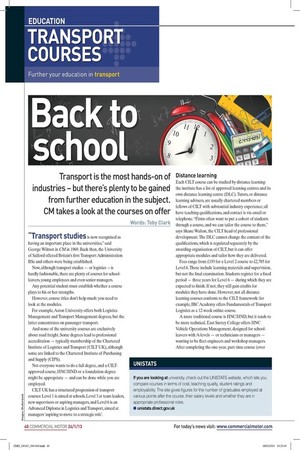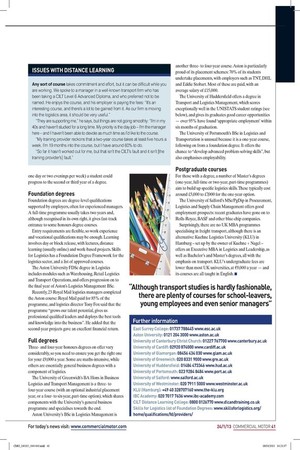Transport is the most hands-on of industries - but
Page 34

Page 35

If you've noticed an error in this article please click here to report it so we can fix it.
Transport is the most hands-on of industries - but there's plenty to be gained from further education in the subject. CM takes a look at the courses on offer Words: Toby Clark Transport studies is now recognised as having an important place in the universities," said George Wilmot in CM in 1969. Back then, the University of Salford offered Britain's first Transport Administration BSc and others were being established.
No although transport studies — or logistics —is hardly fashionable, there are plenty of courses for schoolleavers, young employees and even senior managers.
Any potential student must establish whether a course plays to his or her strengths.
However, course titles don't help much: you need to look at the modules.
For example, Aston University offers both Logistics Management and Transport Management degrees, but the latter concentrates on passenger transport.
And none of the university courses are exclusively about road freight. Some degrees lead to professional accreditation — typically membership of the Chartered Institute of Logistics and Transport (CILT UK), although some are linked to the Chartered Institute of Purchasing and Supply (CIPS).
Not everyone wants to do a full degree, and a CILTapproved course, HNC/HND or a foundation degree might be appropriate — and can be done while you are employed.
CILT UK has a structured progression of transport courses: Level 1 is aimed at schools, Level 3 at team leaders, new supervisors or aspiring managers, and Level 6 is an Advanced Diploma in Logistics and Transport, aimed at managers 'aspiring to move to a strategic role'.
Distance learning Each CILT course can be studied by distance learning: the institute has a list of approved learning centres and its own distance learning centre (DLC). Tutors, or distance learning advisers, are usually chartered members or fellows of CILT with substantial industry experience; all have teaching qualifications, and contact is via email or telephone. "Firms often want to put a cohort of students through a course, and we can tailor the course to them," says Shane Walton, the CILT head of professional development. The DLC cannot change the content of the qualifications, which is regulated separately by the awarding organisation of CILT, but it can offer appropriate modules and tailor how they are delivered.
Fees range from £193 for a Level 2 course to £2,785 for Level 6. These include learning materials and supervision, but not the final examination. Students register for a fixed period — three years for Level 6 — during which they are expected to finish. If not, they still gain credits for modules they have done. However, not all distance learning courses conform to the CILT framework: for example, IBC Academy offers Fundamentals of Transport Logistics as a 12-week online course.
A more traditional course is HNC/HND, but it tends to be more technical. East Surrey College offers HNC Vehicle Operations Management, designed for schoolleavers with A-levels — or technicians or managers — wanting to be fleet engineers and workshop managers. After completing the one-year, part-time course (over one day or two evenings per week) a student could progress to the second or third year of a degree.
Foundation degrees Foundation degrees are degree-level qualifications supported by employers, often for experienced managers. A full-time programme usually takes two years and, although recognised in its own right, it gives fast-track entrance to some honours degree courses.
Entry requirements are flexible, so work experience and vocational qualifications may be enough. Learning involves day or block release, with lectures, distance learning (usually online) and work-based projects. Skills for Logistics has a Foundation Degree Framework for the logistics sector, and a list of approved courses.
The Aston University FDSc degree in Logistics includes modules such as Warehousing, Retail Logistics and Transport Operations, and offers progression on to the final year of Aston's Logistics Management BSc.
Recently, 23 Royal Mail logistics managers completed the Aston course: Royal Mail paid for 85% of the programme, and logistics director Tony Fox said that the programme "grows our talent potential, gives us professional qualified leaders and deploys the best tools and knowledge into the business". He added that the second-year projects gave an excellent financial return.
Full degrees Threeand four-year honours degrees on offer vary considerably, so you need to ensure you get the right one for your £9,000 a year. Some are maths-intensive, while others are essentially general business degrees with a component of logistics.
The University of Greenwich's BA Hons in Business Logistics and Transport Management is a threeto four-year course (with an optional industrial placement year, or a fourto six-year, part-time option), which shares components with the University's general business programme and specialises towards the end.
Aston University's BSc in Logistics Management is another threeto four-year course. Aston is particularly proud of its placement schemes: 70% of its students undertake placements, with employers such as TNT, DHL and Eddie Stobart. Most of these are paid, with an average salary of £15,000.
The University of Huddersfield offers a degree in Transport and Logistics Management, which scores exceptionally well in the UNISTATS student ratings (see below), and gives its graduates good career opportunities — over 95% have found 'appropriate employment' within six months of graduation.
The University of Portsmouth's BSc in Logistics and Transportation is unusual because it is a one-year course, following on from a foundation degree. It offers the chance to "develop advanced problem-solving skills", but also emphasises employability.
Postgraduate courses For those with a degree, a number of Master's degrees (one-year, full-time or two-year, part-time programmes) aim to build up specific logistics skills. These typically cost around £5,000 to £7,000 for the one-year option.
The University of Salford's MSc/PgDip in Procurement, Logistics and Supply Chain Management offers good employment prospects: recent graduates have gone on to Rolls-Royce, BASF and other blue-chip companies.
Surprisingly, there are no UK MBA programmes specialising in freight transport, although there is an alternative: Kuehne Logistics University (KLU) in Hamburg — set up by the owner of Kuehne + Nagel — offers an Executive MBA in Logistics and Leadership, as well as Bachelor's and Master's degrees, all with the emphasis on transport. KLU's undergraduate fees are lower than most UK universities, at €9,000 a year — and its courses are all taught in English. • UNISTATS If you are looking at university, check out the UNISTATS website, which lets you compare courses in terms of cost, teaching quality, student ratings and employability. The site gives figures for the number of graduates employed at various points after the course, their salary levels and whether they are in appropriate professional roles.
• unistats.direct.gov.uk ISSUES WITH DISTANCE LEARNING Any sort of course takes commitment and effort, but it can be difficult while you are working. We spoke to a manager in a well-known transport firm who has been taking a CILT Level 6 Advanced Diploma, and who preferred not to be named. He enjoys the course, and his employer is paying the fees: "It's an interesting course, and there's a lot to be gained from it. As our firm is moving into the logistics area, it should be very useful."
"They are supporting me," he says, but things are not going smoothly: "I'm in my 40s and haven't studied for a long time. My priority is the day job — I'm the manager here — and I haven't been able to devote as much time as I'd like to the course.
"My training provider reckons that a two-year course takes at least five hours a week. I'm 19 months into the course, but I have around 60% to do.
"So far it hasn't worked out for me, but that isn't the CILT's fault and it isn't [the training provider's] fault."
Further information East Surrey College: 01737 788445 www.esc.ac.uk Aston University: 0121 204 3000 www.aston.ac.uk University of Canterbury Christ Church: 01227 767700 www.canterbury.ac.uk University of Cardiff: 02920 874000 www.cardiff.ac.uk University of Glamorgan: 08456 434 030 www.glam.ac.uk University of Greenwich: 020 8331 9000 www.gre.ac.uk University of Huddersfield: 01484 473346 www.hud.ac.uk University of Portsmouth: 023 9284 8484 www.port.ac.uk University of Salford: www.salford.ac.uk University of Westminster: 020 7911 5000 www.westminster.ac.uk KLU (Hamburg): +49 40 328707160 www.the-klu.org IBC Academy: 020 7017 7636 www.ibc-academy.com CILT Distance Learning College: 0800 0126770 www.dlcandtraining.co.uk Skills for Logistics list of Foundation Degrees: www.skillsforlogistics.org/ home/qualifications/fd/providers/










































